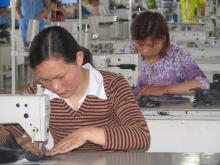workers' rights

On April 18, the court heard oral arguments in Groff v. DeJoy, a case addressing an employer’s obligation to accommodate religious employees’ requests under federal law. The dispute involves a Christian postal worker who quit his job and sued the U.S. Postal Service after he was unable to find coverage for his Sunday shifts. Current law requires employers to make accommodations for workers’ religious requests only if doing so doesn’t impose more than a minimal cost on their business, known as the “de minimis” standard.
After listening to the oral arguments in the case, I believe it’s very likely the court will overturn the de minimis standard and require employers to accommodate more religious requests.

IF JESUS HAD been in Bessemer, Ala., he would have stood with the workers who tried and failed to organize the Amazon distribution center there.
That was the firm conviction of Joshua Brewer, a lead organizer for the Retail, Wholesale, and Department Store Union (RWDSU). “It’s everything we’re told to do—to look out for our brothers and sisters in need, that a [person] should be paid for an honest day’s work an honest day’s wage, that we need to look out for the immigrant, that we need to look out for the widows and the children and the orphans, and we need to look out for each other,” Brewer told the Alabama Political Reporter in the heat of the campaign.
Brewer was hardly alone in his belief that the Bible offered clear sanction for RWDSU’s fight. On-the-ground reporting underscored that organizing meetings began with prayer, and that an instinctively pro-labor faith steeled many of those who participated in the campaign. In longer historical perspective, none of this is surprising. From the beginning, many workers who powered the labor movement did so with the confidence that Jesus, a lowly carpenter, had their backs.

Nicki Minaj usually isn’t associated with Indian workers' rights. But that’s not stopping 27-year-old Chinnai-born rapper Sofia Ashraf from rapping against Unilever, a corporation accused of dumping waste in an Indian town. According to a local environmental group, high levels of mercury can still be traced in vegetation and soil around the former factory.

THE APRIL 24 collapse of a garment factory near Dhaka, Bangladesh, killed more than 1,125 people. That tragedy followed a fire that killed 112 last November at a factory making goods for companies including Walmart. According to the International Labor Rights Forum, at least 1,800 garment workers in Bangladesh have died in fires or other factory disasters since 2005. The collapse near Dhaka is the largest disaster in that time and the one that has gotten global attention.
As a Dominican Catholic sister and member of Catholic Scholars for Worker Justice, I approach reflection on such a disaster from the foundation of Catholic social teaching. Each of the social principles below relates to the situation in Bangladesh and challenges us to reflect on our own regard for those who provide our clothing.
- Life and dignity of the human person. Story after story of the people who work in the garment industry shows the lack of respect for workers. Long hours, few to no breaks, prevalent verbal, physical, and sexual abuse, and now the collapse of a factory—do we need any more proof that human life is held in so little regard? Many years ago, Cardinal Joseph Bernardin called for an understanding of “respect life” as inclusive of human life “from womb to tomb.” Our upholding of life must include working toward changing factory conditions so that a debacle such as Dhaka never happens again.